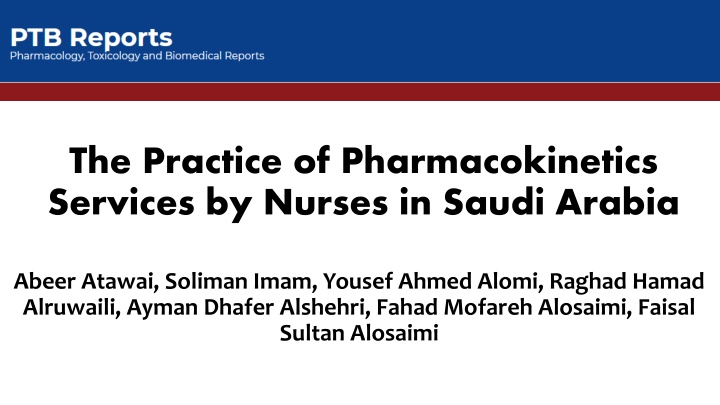
Pharmacokinetics Services by Nurses in Saudi Arabia Study
Explore the practice of pharmacokinetics services by nurses in Saudi Arabia through a comprehensive survey of 408 nurses. Results indicate a generally acceptable standard of practice, highlighting areas for potential improvement in drug utilization and research.
Download Presentation

Please find below an Image/Link to download the presentation.
The content on the website is provided AS IS for your information and personal use only. It may not be sold, licensed, or shared on other websites without obtaining consent from the author. If you encounter any issues during the download, it is possible that the publisher has removed the file from their server.
You are allowed to download the files provided on this website for personal or commercial use, subject to the condition that they are used lawfully. All files are the property of their respective owners.
The content on the website is provided AS IS for your information and personal use only. It may not be sold, licensed, or shared on other websites without obtaining consent from the author.
E N D
Presentation Transcript
The Practice of Pharmacokinetics Services by Nurses in Saudi Arabia Abeer Atawai, Soliman Imam, Yousef Ahmed Alomi, Raghad Hamad Alruwaili, Ayman Dhafer Alshehri, Fahad Mofareh Alosaimi, Faisal Sultan Alosaimi
Objectives: To explore the essential practice of Pharmacokinetics Services by Nurses in Saudi Arabia. Materials and Methods: It analyzes a cross-sectional survey discussing the essential practice of Pharmacokinetics Services by Saudi Arabian nurses. The survey consisted of respondents demographic information about The crucial practice of Pharmacokinetics Services by the nurses at the institution. The availability of Drug-level services at the institution, the nurses requested any pharmacokinetics or drug level, the Number of patients needing drug-level services, and the Number of drug levels observed/ suspected daily. Besides, most medications are requested to check blood levels. The 5-point Likert response scale system was used with closed-ended questions. The survey was validated through the revision of expert reviewers and pilot testing. Besides, various tests of the reliability of McDonald s , Cronbach alpha, Gutmann s 2, and Gutmann s 6 were done with the study. The data analysis was done through the Survey Monkey system. Besides, the Statistical Package of Social Sciences (S.P.S.S.), Jeffery s Amazing Statistics Program (J.A.S.P.), and Microsoft Excel sheet version 16.
Results: A total number of 408 nurses responded to the questionnaire. Of them, almost two-thirds responded from the central region (140 (34.31%)) and southern areas (119 (29.17%)), with statistically significant differences between the provinces (p=0.000). Most of the responders were from Ministry of Health (M.O.H.) hospitals (267 (65.44%)), with a statistically significant difference between working sites (p=0.000). Males responded more than females (210 (52.24%)) versus 192 (47.76%)), with statistically significant differences between all levels (p=0.000). Most of the responders were in the age group of 36-45 years (227 (55.91%)) and 46-55 years (99 (24.38%)), with statistically significant differences between all age groups (p=0.000). The majority of responders, 372 (91.85%), worked at an organization that had drug levels form, with most of them, 378 (93.33%), ever requesting Pharmacokinetics services or drug levels with statistically significant differences between all answers (p=0.000). The total Number of patients serviced of drug levels requested was (2,609) daily, with an average number (of 6.58) per hospital. Those drug levels requested were needed for (16.82) patients daily per hospital, with a total number of patients being (6,663); The average Number of drug levels requested orders per patient was (2.55) (Table 3). The average score of practice items for Pharmacokinetics Services at the institution was (3.79). The Mission of Pharmacokinetics Services system obtained the highest score (4.00). In contrast, the lowest score was obtained for Pharmacokinetics services and research (3.58).
Conclusion: The nursing practice of pharmacokinetic services is acceptable. Most nursing responders partied in pharmacokinetics services at their healthcare medications. The workload of pharmacokinetics services was high at the nursing department. The annual plan and research of pharmacokinetics services did not reach the optimal level. The nursing practice standard of pharmacokinetics services should be reviewed, and drug utilization is required to improve the nursing practice of pharmacokinetics services. organization with appropriate
KEYWORDS Nurses, Practice, Pharmacokinetics, Drug level, Saudi Arabia.
The nursing practice of pharmacokinetics services is acceptable through cross-sectional surveys of practiced nursing among various healthcare organizations. Most nursing responders practice pharmacokinetics services with available services at hospital healthcare facilities. The strategies and mission of pharmacokinetics services are common findings. However, the annual planning of pharmacokinetics and clear vision for the future is unclear. The number of drug levels requested was high with various medications such as Gentamicin and Digoxin. Various factors might positively influence respondents answers, such as Age and number of patients needed for drug- level services. During the presence of Drug levels of pharmacokinetics services at the institution, the number of drug levels requisition might affected negatively. The policy and procedures with practice standards should be reviewed thoroughly. Drug level utilization is an additional key performance indication warranted in nursing practice. Further research to monitor the nursing practice and improve pharmacokinetics is required at a healthcare organization in Saudi Arabia.
